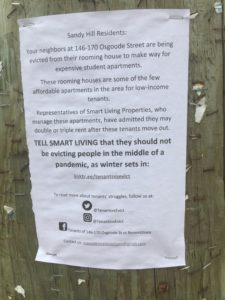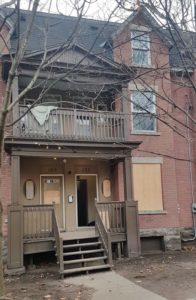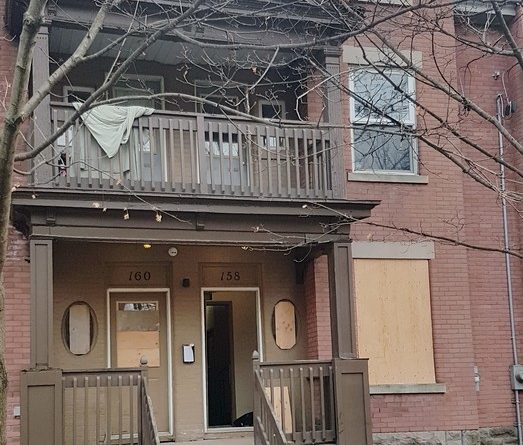It’s past 30 October—now what?
Larry Newman
In the last issue of IMAGE, we published an article revealing a plan to evict all tenants from the rooming houses at 146 to 170 Osgoode St. by October 30 in order to renovate the buildings. The tenants refer to this as a renoviction and have formed a tenants’ coalition to protest the eviction.

Photo Jane McNamara
The eviction notices were sent on June 30th, this year. A cardiologist and real estate investor, Binny Kuriakose, bought the properties last spring in the name of 146 Osgoode St. Holdings Inc. Smart Living, a local property management company, is managing the project.
In response to the eviction notice, the tenants wrote a three-page letter to Kuriakose on August 5, proposing/demanding the right to stay in their apartments during renovations. On August 19, tenants received a letter from Jonathan Bielecki (apparently in charge of relocation) offering three “packages” as encouragement to move.
The first was a cash payment of 12 times current monthly rent and money for a cash deposit on the tenant’s new home. The second was three times current rent and assistance in finding a new place as well as help furnishing and moving. The third “package” was for the landlord to take the eviction notice to the Ottawa Landlord and Tenant Board.
Below a graphic representation of each of these “packages,” Mr. Bielecki, writing as though he is an owner too, wrote the following: “…I did not buy this to be a SLUMLORD to people—at the end of this—these people will be in a better position when I provide them an EXIT PACKAGE TO MOVE.”
On Aug 19, Smart Living’s property manager for the Osgoode properties, Howard Kravitz, personally presented the landlord’s response to tenants’ demands. In his pitch to encourage/pressure tenants to move, he said, “We’re not going to put you in a rat-infested place, BUT…”. Mr Kravitz was referring to the second of the three packages.
All options require the tenants to leave so that these buildings can be renovated. The tenants’ coalition replied on September 1 with another set of demands. These included allowing some of the residents to stay in their apartments while other apartments are being renovated and to move to a renovated apartment once it became available. Implied in this plan is that some of the current tenants will move before renovation begins. (In fact, more than half of the tenants seem to have taken one of the offers.) The letter also calls for the current rental rates to apply to the newly renovated apartments.

Photo Larry Newman
Many of these apartments are not nice living quarters. They are poorly maintained and the tenants pay approximately $500/month. Mr. Bienecki refers to them as “a horrible building filled with bedbugs, black mould (sic), & no one should live in these conditions…” Most tenants have few options to pay for a more expensive apartment.
Availability of low-rent housing is a big problem in Ottawa. It will be very difficult for these tenants to find affordable housing. As of November 16 there are still some tenants in residence but many windows are covered with plywood.
“We are talking about a housing crisis,” said Sloane Mulligin, a volunteer support organizer for the organization, Tenants of 146-170 Osgoode St. vs. Renovictions. “This is happening right in front of our eyes. This is the time when people need to step in, question, and challenge it.”
This is provincial jurisdiction through the Landlord and Tenant Board and the Residential Tenancies Act. “Toronto had similar questions raised and their City Solicitor advised that they did not have the authority to enact a ban,” says Erin Woods, Councillor’s Assistant to Ottawa Councillor Mathieu Fleury.
Mathieu Fleury, Councillor for Ward 12 Rideau-Vanier and chair of the Ottawa Community Housing Board, said he has spoken with the new property owners. “I’ve asked them for compassion. I’ve asked them to engage more with the tenants,” he said. “They have a social responsibility.”
Energized by the eviction plans, David Wiseman, associate professor at University of Ottawa’s Faculty of Law, Common Law Section, decided to turn his four-credit Access to Justice Lab into an experiential learning class especially to support the tenants. Since September, in partnership with lawyer Daniel Tucker-Simmons, Wiseman’s class of 13 students has been investigating facts and evidence in tenant eviction cases around Ottawa. This is one of their cases.
Wiseman and the students are also involving Ottawa Acorn, an organization which hosts public information sessions on tenant rights. Wiseman is optimistic about putting forth a human rights case around the legitimacy of the evictions. Additionally, Wiseman believes the university as a whole has the responsibility, not just to the students who would be living there, but to the Sandy Hill community.
The tenant’s coalition has created a Facebook page (Tenants of 146-170 Osgoode St vs. Renovictions) and it can be reached by email at OsgoodeStRenovictions@gmail.com.
